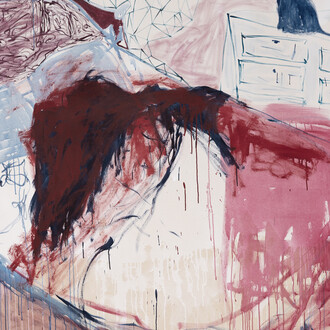The conquest of space and time and the mastery of the world (of both “mother earth” and of global markets) appear in many fantasies as sublime masculinist expressions of sexual desire and millennial belief. A major principle in Karl Marx’s Grundrisse is that capital must strive to tear down every spatial barrier to intercourse, i.e., to exchange, and conquer the whole world for its market.
Depictions of landscape in painting and film are often associated with subjective transformation. A moment of near frisson, setting is seen as a state of mind. In literature a narrator in a heightened state such as that of convalescence can explicate a similar sensation. The film from their mental vision having departed, such a protagonist, dandy-like, is more able to give over to the slipstreams of the city, or indeed, the crowd. Love is the conquest of discontinuity between individuals.
Merchants learned quickly that survival lay in cultivating a superior ability to manoeuvre in space, and today, hegemony maintains itself much by virtue of space-time compression. A power-geometry is put into play: Some people initiate flows, others do not, the rest are left on the receiving end. Capital’s ability to roam the world strengthens it in relation to its relatively immobile ‘users’, or those rendered immobile, because they can only roam its mesh of parcellised time and morbid analogons.
In a 1991 interview, bell hooks describes the sensation of experiencing a “pausitive life crisis”. In the same interview hooks goes on to say: “resistance at heart must mean resistance against all things that are like war”. The immediate readiness of a well-disciplined work force is an essential condition of production and is fostered in a number of ways, some of which are subject to the kind of ideological imperatives that are especially popular in times of crisis and austerity. One such example is the veneration and by-proxy organisation of the family as a private sanctum or “as the last frontier where men and women keep their souls alive”[1].
At every level, spaces are produced which act as interstices of economic and political relations. Coercion and persuasion converge with the power of decision-making and the capacity to consume. Occupied by these (no longer very new) masters, who hold the centre without strict spatial policy. Especially, they have the right to possess time.[2] Verging on the sublime, these spaces roll out and multiply over the planet, each full of internal structures of domination and subordination, or domination and submission.
The lures of producing and incubating more future workers and soldiers meant that for Feminism, at least, the concept of reproduction, and its mendacious appearance as another act of love, lost its grip on the imagination some time ago. In 1975 Silvia Federici described Woman’s loss of identification with servicing reproduction, writing: “Our faces have become distorted from so much smiling, our feelings have disappeared from so much loving”[3].
One place seen through the lens of another, renderings of landscape often rest on a tragic/euphoric order. Nothing about the landscape changes physically but a camera disinvested from duties of flattery might turn its gaze towards an economy of plunder.
[1] Federici, Silvia and Cox, Nicole, “Counterplanning from the Kitchen (1975)”, Revolution at Point Zero:
Housework, Reproduction and Feminist Struggle, PM Press, 2012, p.35.
[2] I am paraphrasing from Lefebvre, Henri, “The right to the City (1968)” Writings on Cities, Blackwall, 2010,
p.131.
[3] Federici, Silvia, “Wages Against Housework (1975)”, ibid, p.19.
















